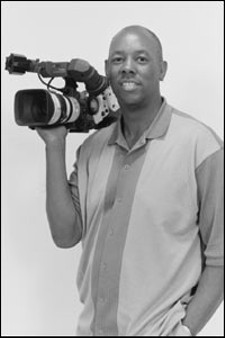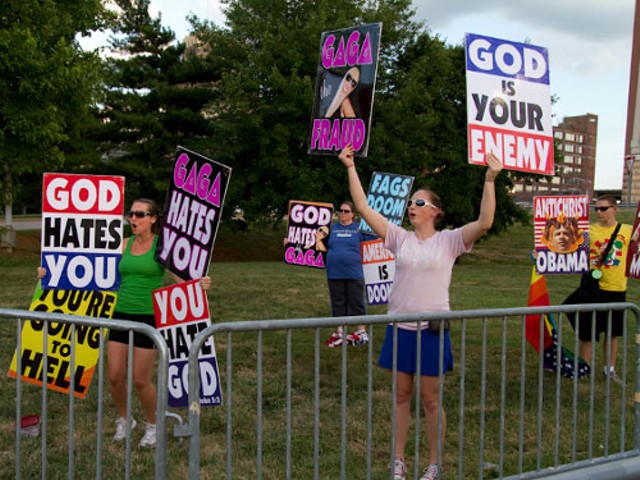Last week, we published an interview with Art Holliday, who's working on a documentary about Chuck Berry pianist Johnnie Johnson, called Johnnie Be Good. Here's part two of our chat, below.
Speaking of funding, how have you been funding the film? In the beginning, I knew that I was going to have an unbelievable amount of travel. -- little did I know it would be 27 trips out of St. Louis -- but I knew that there was going to be a lot of travel. A lot of people that I needed to talk to weren't necessarily going to come through St. Louis, so I was going to have to go to them. So you know, it was me and my credit card. When I started shooting footage and gathering material, then I went to the CALOP Committee (The Commission for Access and Local Original Programming) in University City. And thank goodness that University City is one of the chief cities in the country that sets aside money in their annual budget to support independent filmmakers.
So I got two grants from CALOP and University City, the Missouri Arts Council has given me a grant, the Regional Arts Commission has given me a grant, I've held fundraisers of every sort from total strangers hosting friends in their home to some of the venues that Johnnie played at hosting fundraisers. People have donated privately. So I've had a tremendous amount of support of all types and I'm grateful for all of it.
One of the coolest fundraisers is yet to happen. It's September 19. Three members of Conan O'Brien's band -- Jimmy Vivino, Mike Merritt and James Wormworth -- are coming to St. Louis to perform at the Sheldon. People who are fans of Conan, they might not know the musicians by name, but they're certainly aware of the band, because the band is great. And these three musicians were Johnnie's unofficial East Coast band. Whenever he went to the East Coast, to New York or anywhere, these were the guys that he played with. And he toured internationally with them, including the Montreux Jazz Festival. Johnnie did an instructional DVD, and these were the musicians that performed on that.
They adored Johnnie, and they're showing their respect and admiration for Johnnie by supporting this project about his life and music. And I'm really grateful to those guys, so I hope people will come out and see [them]. They're not household names, unless you're really, really a hardcore fan. But trust me when I say [that] these are some of the best musicians in the world. And if you take the time to Google any one of them and take the time to see who they've played with, the list is unbelievable.
The really cool thing about the September 19 event is that the opening act is a young woman named Dona Oxford. Shes going to be performing with the Johnnie Johnson band. So every single musician that night has a direct link with Johnnie Johnson. So I'm going to talk to them during the concert and have them tell their favorite Johnnie Johnson stories and just give people some insight; what was it like to share the stage with Johnnie. In Dona Oxford's case, she was literally a student of Johnnie Johnson, and she was his musical daughter. That's the only reason I know her, is because of doing this project.
I landed on her website by accident. I interviewed her, she's in the film. And we've actually become great friends over the years because of our mutual interest -- and then friendship -- with Johnnie Johnson.
How did you get into contact with the other musicians? The Conan O'Brien musicians?
Yes. Initially, the first musician I interviewed was Jimmy Vivino, and I interviewed him probably five years ago in New York. I kinda stayed in touch with Jimmy, and he indicated to me that Mike Merritt and James Wormworth would like to be interviewed, too. I interviewed them [together] earlier this year in Los Angeles. And they said, "We wanna do a group interview together where we just talk about Johnnie. So we're going on tour with Conan all over the country this summer. Maybe you could meet us in Chicago or Kansas City." I wound up going to Kansas City a couple of months ago, and I interviewed them all on their tour bus. They were kind of playing off each other, talking about some of the international tours that they took and talking about Johnnie's hat wardrobe. One of the coolest stories is one that Jimmy told. He said [that] he still dreams about Johnnie all the time. In his dreams he's always on stage with Johnnie. I thought that was a really cool story to share, and that will become part of my documentary.
These guys -- not unlike Bob Weir and the members of Rat Dog, who Johnnie also toured with -- they just love Johnnie the person. Everybody that's seen Johnnie Johnson play realizes that he was a piano genius. But all of the people that I've talked to -- from Taylor Hackford to Bonnie Raitt to the Conan musicians -- they all talk about what a humble genius Johnnie was and how he wasn't interested at all in trying to tell people how famous he was or who he had played with. And you look at the list of people he played with: Eric Clapton, the Rolling Stones. Keith Richards produced one of Johnnie's CDs [and] co-wrote a song with him. He did a recording project with Aerosmith and Styx and John Lee Hooker.There's a reason Johnnie's in the Hall of Fame. Because he's an incredible musician. But All of these people talk about what a great human being Johnnie was. So that's a big part of the story as well.
It's great for the project to interview Eric Clapton or Keith Richards -- I mean, these people are just like Chuck Berry, they're international icons. But the number one story of anybody is John Sebastian's. In 2000, when the Lovin' Spoonful was inducted into the Rock & Roll Hall of Fame, John Sebastian quickly shipped his Hall of Fame trophy to Johnnie's house in St. Louis. It was a sign of respect, because Johnnie wasn't in the Rock & Roll Hall of Fame yet. As it turns out, he went in the following year. But for close to a year, John Sebastian's Rock & Roll Hall of Fame trophy was in Johnnie Johnson's living room. I heard this story from a third person, so I don't even know if it's true or not, but I gotta find out.
So I got to John Sebastian.com, and I e-mailed him, and luckily he called me back the very next day. So on the same road trip that I interviewed Eric Clapton, after I interviewed Clapton, I drove to Woodstock where john Sebastian lives. I walk into his house, and the very first thing I see in his family room is the Hall of Fame trophy. So I said "John? When I ask you the money question, I want you holding the trophy. And then I want you to explain why when this is your moment in the spotlight, when everybody's remembering your hall of fame career, why you were thinking about Johnnie Johnson."
So while he's answering the question, he pulls out the original note that he sent with the trophy. And it says, "To Johnnie Johnson, from all of the Hall of Fame inductees. We remember what you did, and we'll never forget." And to me, that one story illustrates why, if you call yourself a music fan, you need to spend a little time Googling Johnnie Johnson, checking out his music, the people he performed with and his role in music history.
When do you anticipate being finished with the film? Well, there's a couple of ways of answering that. When the film is great, because that's my goal. I'm not interested in making an average film. When it comes out, other people may say it's average. But It will be done when I feel it's up to the level of Johnnie Johnson's music. And then, as a practical matter, because of all of the music and the film clips and the video clips, I will have to raise a substantial amount of money. I don't know if that's going to come from an individual investor, I don't know if that's going to come from a film distributor. I don't know where that's going to come from. I've always felt if the film was good enough, I would find the money some way. The only thing I have control over is how great the film is. And how much of my time and my passion I put into it.
So, It might be 2011, it might be 2012 -- I don't know. Right now, we've got about 90 minutes of the first edit done, and that's about 80 pages of the script. Right now, the script in its current version is about 120 pages. So, I'm about two-thirds of the way through the first edit. After that, I'm going to meet with George Hickenlooper, who's a Hollywood director and a native St. Louisan who makes feature films and documentary films. You guys have written about him over the years many many times. He's my executive producer and story editor. So after I get my first edit done, I'll probably go to LA meet with him, take some notes, and then my editor John King and I will start whittling away, deciding what stays what goes, refining the script, making sure it flows.
And then, obviously the other factor for me is time. I don't have the luxury, like most independent filmmakers, of working on this eight hours a day. i have a very demanding career at the TV station, so I don't have any choice but to take my time. However long it takes for it to be great and to be well-received hopefully all over the world, then that's how long it takes. I only have one chance to release it, and when I do, I want people to be blown away. That's always been the goal.
What message would you like audiences to leave your film with? Here's what I want people to remember. As music fans, mostly we pay attention to the superstars. We pay attention to Chuck Berry. We pay attention to Elvis Presley. We pay attention to Bono. None of those guys do it alone. Mick Jagger doesn't do it alone. So this is a tribute to sidemen.
One of my favorite quotes about Johnnie Johnson, this was in the days following his death in 2005, David Fricke of Rolling Stone wrote, "Johnnie Johnson became the greatest sideman of rock 'n' roll at the moment the music was being born." That's the starting point for this whole story. Johnnie was on the short list of people who created one of the most important musical genres in the history of music, and it all started here in St. Louis. That's what I want people to remember.






